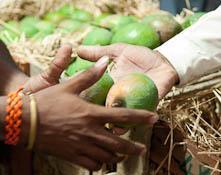
Indian mango exports to the US have had a hard time competing with cheaper Mexican mangoes on the market, but a new government initiative to send the fruit by sea rather than air could reduce the landed price to comparable levels.
The initiative is being experimented with by the Agricultural and Processed Food Products Export Development Authority (Apeda), reported the Economic Times.
Apeda expects losses as a result of the longer seafreight times, but will provide a subsidy to exporters of up to Rs35,000 or 50 per cent of losses, whichever is less.
According to the Times report, trial runs will begin this season. Apeda has also developed a seafreight protocol.
Access to the US for Indian mangoes was granted in 2007, and Japan in 2006.
Indian mangoes hit the US market by airfreight, and sold last year for US$25-30 per carton, compared to Mexican mangoes prices at US$15-20 per carton.
“If we are able to send mangoes by sea, our prices will be at par with the Mexican,” an Apeda official told the Times. “If we are able to sell high volumes of our fruits in these markets, it will give us credibility and open up other markets.”
The Maharashtra State Agricultural and Marketing Board (MSAMB) and the Gujarat Agro Industries Corporation are also considering pitching in to help exporters bear some losses.
“Mango is a delicate fruit, government support is necessary for its despatch by sea. We are trying to rope in some private players who have earlier sent mangoes to Japan by sea, to develop a sea protocol,” said an MSAMB official.
The first shipment of Indian mangoes to Japan for the season was sent on Wednesday.



